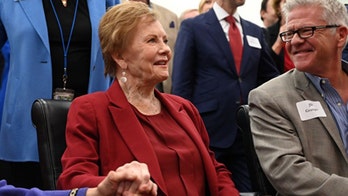
Former Massachusetts Gov. Mitt Romney waits while he is introduced to employees at Lincoln Financial Group in Concord, N.H., June 27. (AP)
Much has been made about whether evangelical Christians could support a Mormon presidential candidate like Mitt Romney in the GOP primary. But a recent Gallup poll shows Democrats are far more likely than Republicans to oppose a Mormon for president.
The survey suggests a candidate like Romney would have at least as tough a time overcoming voter anxiety in a general election as he would in the race for his party's nomination. And, analysts say, the numbers underscore the lingering trouble Mormons are having gaining national and bipartisan acceptance as a product of their concentration in just a handful of states.
"Mormons ... still fall into that kind of category of the other, the unknown," said Laura Olson, a political science professor at Clemson University who has written extensively about the intersection of religion and politics.
According to data from the American Religious Identification Survey, America has more Mormons than either Jews or Muslims. They have congregations across the country, even though they're concentrated in Utah and other western states. While it follows that most of the 15 Mormons in Congress are from those states, their tight concentration could be making it harder to appeal to voters beyond the Rockies -- particularly Democrats.
The poll showed that 27 percent of Democrats would not be willing to vote for a presidential candidate of their party who happened to be Mormon. Among Republicans, that number was 18 percent.
Olson surmised that one reason Democrats are more reluctant to back a Mormon is because of a perception that they are more socially conservative. After all, the Mormon church caused a firestorm when it joined the battle against gay marriage in California.
Olson also said some of it might be "intolerance." And she pointed to the assumption that voters averse to supporting a Mormon probably don't live in areas where they meet many -- the poll didn't break down voter attitudes by state, though it did show, curiously, those in the East slightly more tolerant toward Mormons than Americans in other regions. At the same time, there are no elected Mormons from the Eastern U.S. in Congress.
Regardless, Olson said biases start to fade when people meet or become familiar with members of a particular religion or group. Though there are prominent Mormons in Congress, she said many voters probably don't even realize that lawmakers like Senate Democratic Leader Harry Reid are members of the Church of Jesus Christ of Latter-day Saints flock.
Other prominent Mormon lawmakers include Sens. Orrin Hatch, R-Utah; Mike Crapo, R-Idaho; Tom Udall, D-N.M.; and Mike Lee, R-Utah.
Most Mormon lawmakers in Congress are Republican. The Gallup poll, though, showed an anti-Mormon bias has remained robust among voters in both parties for decades. Across members of both parties and independents, the fraction of voters who said they would not support a Mormon presidential candidate was 22 percent. In 1967, that number was 17 percent.
The only groups more distrusted by voters are gay or lesbian candidates and atheists -- 49 percent say they would oppose an atheist for president.
By contrast, the percentage is in the single digits for people who would oppose a candidate because they are black, female, Catholic, Baptist or Jewish.
Allen Hertzke, political science professor at the University of Oklahoma, said suspicions about Mormons have lingered for decades, fueled by perceptions that they are "tight knit" and outside mainstream Christianity.
"It has its roots really in the 19th century going forward, that Mormons were viewed as cultish or cult-like," he said. "They've had to struggle in a sense to establish their legitimacy or acceptability."
Hertzke also disputed the notion that religion would be a big factor in a general election for a Mormon candidate. Pointing to survey results conducted several years ago by Pew Research Center that showed Republican evangelicals highly suspicious of Mormon politicians, Hertzke argued that Romney and Jon Huntsman will continue to have issues in the primaries because of their faith.
Mainstream Mormons also have the misfortune of being historically affiliated with the breakaway Fundamentalist Church of Jesus Christ of Latter-day Saints -- whose members infamously practice polygamy. Shows about plural marriage like "Big Love" and "Sister Wives" probably don't help public perception of the Mormon community, even though the LDS church does not condone polygamy and takes great effort to separate itself from the Fundamentalists.
To counter public perceptions, the church last year launched an ad campaign showing Mormons talking about everyday things like surfing and skateboarding.
Olson said that to really break through voter anxiety, Mormon candidates need to do an obvious thing.
"The best way for Mormon politicians in general to get past the bias is for some of them to win," she said.




